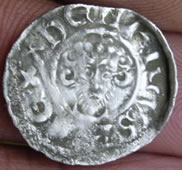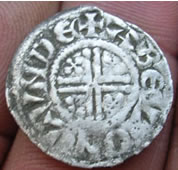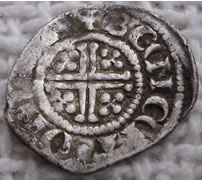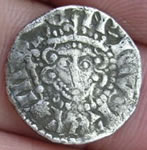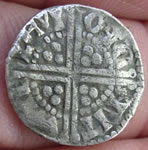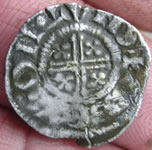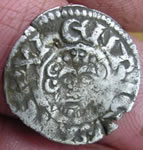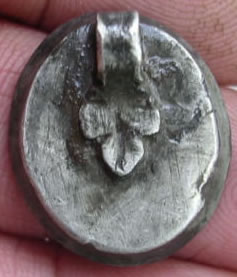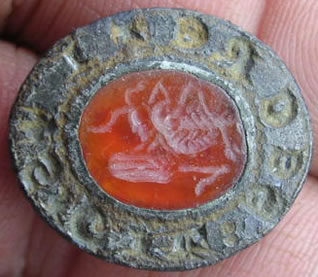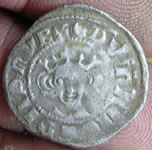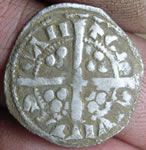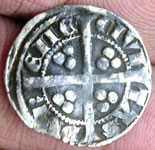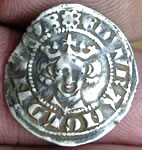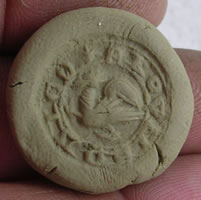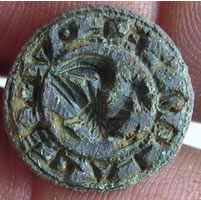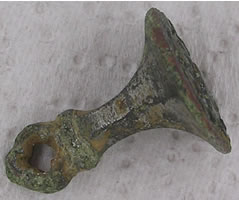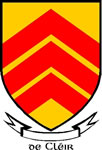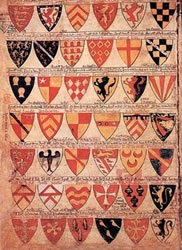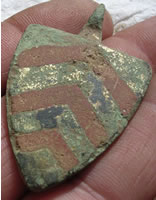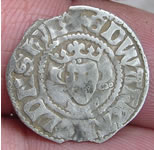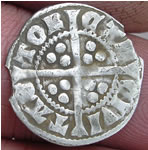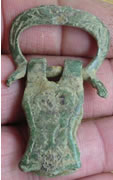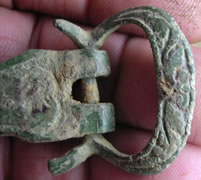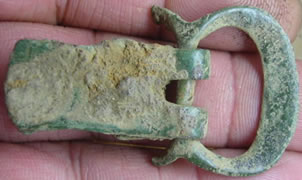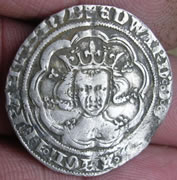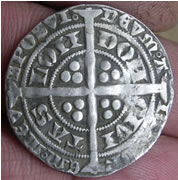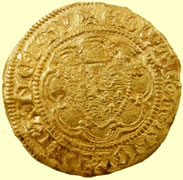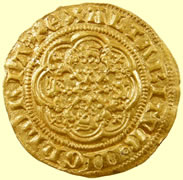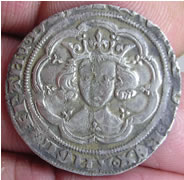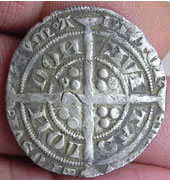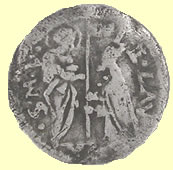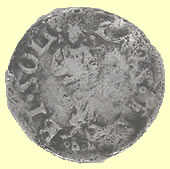

Metal detecting holidays in England with the World's most successful metal detecting club.20 years plus.
Twinned with Midwest Historical Research Society USA.
1066 -1377 AD |
The Normans that invaded England in 1066 came from Normandy in Northern France. However, they were originally Vikings from Scandinavia. At the beginning of the tenth century, the French King, Charles the Simple, had given some land in the North of France to a Viking chief named Rollo. He hoped that by giving the Vikings their own land in France they would stop attacking France. The land became known as Northmannia, the land of the Northmen. It was later shortened to Normandy. The Vikings intermarried with the French and by the year 1000, they were no longer Viking pagans, but French speaking Christians |

William I 1066 - 87 William the Bastard, the Duke of Normandy and conqueror of England was crowned today in Westminster Abbey Christmas Day 1066. The Archbishop of York officiated at the coronation of the third king to sit on the English throne in less than a year. However, after swearing to rule justly, William introduced a change to the traditional ceremony which nearly led to disaster. All present were asked in English and French whether they acknowledged William as their rightful king. The Norman guards outside thought the shouts of acclaim were the start of a revolt, and in a panic burned down all the houses around the church. William’s wife Matilda is still in Normandy and missed the ceremony. England 1070. The Normanisation of English life is proceeding apace, and English holders of office in church and state are now few and far between. The officers of the Royal Household, the steward and butler, the constable and the chancellor have all been replaced by Norman. King William has been lavish in rewarding the Norman counts who came over with his army, on the principle that all land belongs to the king. The old English nobility Siwards of Northumbria, Edwin of Mercia the Godwins of Wessex have been dispossessed Isle of Ely 1071. The Norman conquest of England seems to be complete. Another flicker of resistance died out here when King William first besieged the rebels and then received their submission - but failed to capture their leader Hereward the Wake. He disappeared into the swampy maze of the Fens Normandy 12 September 1087. King William was buried at Caen today in a gruesome ceremony at his abbey St. Stephen. He died at Rouen of injuries received when leading the sack of Mantes in France. Among the burning ruins, his horse stumbled and threw him. William II Rufus 1087 - 1100 But the vanguard of the Norman fleet was sunk and Robert never arrived. Odo surrendered and was exiled. Winchester, 3 August 1100. The King of England, William Rufus was killed yesterday in a mysterious hunting accident in the New Forest created by his father, William I. His body was brought here today on a charcoal-burners cart and buried beneath the cathedral tower. His brother, Henry, who was out hunting with him, rode here ahead of the body, seized the royal treasury and, after a council at which he was hurriedly elected king, rode on the London to secure the crown before the imminent return of Robert the rightful heir. Rouen, Normandy, February 1091. William Rufus the King of England, and his brother Duke Robert Curthose of Normandy, made peace here today to end three years of sporadic warfare. At Easter 1088 conspirators rose against William, expecting Duke Robert to land with an army in the south-east. Bishop Odo and his rebels captured several towns and castles including, Rochester, Pevensey and Tonbridge.
Henry I 1100 - 1135 London 11 November 1100. The dynasties of Alfred the Great and William the Conqueror were united to day at the alter of Westminster Abbey, when King Henry I of England married Edith, the sister of King Edgar of Scots and great-grandfather of King Edmund Ironside. The royal wedding is quite a coup for the youngest son of the Conqueror; it gives him an ally in King Edgar and removes any doubts about the legitimacy of the Norman succession. Edith will take the Norman name Matilda. Rouen Normandy, 1 December 1135. King Henry has died of food poisoning caused by gorging himself on lampreys, against the advice of his physician, while on a hunting expedition in the Forest of Lyons. Only one child, his illegitimate son Robert, the Earl of Gloucester was at his bedside. Stephen of Blois 1135 - 54 London 22 December 1135. Stephen of Blois who sailed from Boulogne to seize the reigns of power in England the moment he heard of the death of his uncle King Henry, was today crowned king by the archbishop of Canterbury. The reluctant archbishop was persuaded to legitimize Stephen’s accession despite the oath sworn to Henry by Stephen and other notables recognizing his daughter, Empress Matilda, as heir to the throne. Matilda, the widow of Holy Roman Emperor Henry V and now married to Geofrey of Anjou, is a formidable woman who will fight for her inheritance Faversham 25 October 1154. King Stephen was buried today alongside his wife and son in the choir of the Cluniac abbey that he founded here. He was a brave knight and could act decisively, but he was feckless and lacked the judgment England needed from its king in turbulent times. 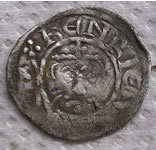 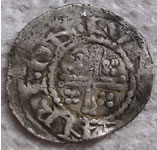 Henry II 1154 - 89 Fontevrault, France July 1189. King Henry II lies in state at the abbey here, the achievements of his 34 year reign overshadowed by the ignominy of his end - betrayed his sons, his empire in ruins, obliged to surrender to his greatest enemy, King Philip of France. When his rebellious son and heir, Richard came to attend his fathers corpse, blood oozed from his nostrils. Those present were horrified - corpses are said to bleed in the presence of their murderers. Westminster July 1155. To the relief and gratitude of a population weary of civil war under his predecessor Stephen, King Henry II is rapidly proving himself a powerful and charismatic monarch. He has already dealt with baronial opposition, and there is now no one to pose a serious challenge to his authority. 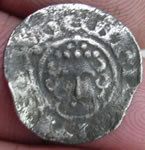 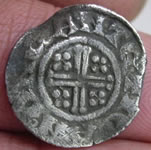 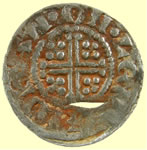 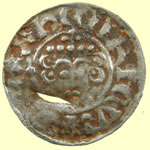 Richard I 1189 - 99 Westminster 3 September 1189. Duke Richard of Aquitaine, the son of the late King Henry II and Eleanor of Aquitaine , was crowned king of England at Westminster abbey today. Richard is popular for his dashing knightly qualities, although the chivalrous new king is said to be more interested in wooing men than women. He is especially close to King Philip of France. Jerusalem 9 August 1192. The Third Crusade which began in 1190 when King Richard and Philip of France joined forces to drive the Moslem leader Saladin from the Holy Land, is over. The Christian army has halted just 12 miles from Jerusalem, and under the treaty of Jaffa the king has agreed three years peace.
King John 1199 - 1216 Westminster 27 May 1199. King John was crowned today, a month after he was invested Duke of Normandy in Rouen, and seven weeks after the death of his brother Richard. There was a bad omen at the Rouen ceremony.: John dropped his ducal banner. John thus acquired the nickname ‘Lackland’. John’s three brothers have all died and John has inherited everything, although Anjou and Tourainne have declared for his nephew Arthur of Brittany. His mother Queen Eleanor holds her own Duchy, Aquitaine for him. Runnymede 27 July 1215. King John has given way to his barons and grudgingly accepted a charter of liberties which they presented to him here by the Thames west of London. It includes grievances which he has vowed to redress and set up a council of barons to enforce his compliance. London January 1227. Eleven years after his unorthodox coronation, Henry, still only 20 years old, has assumed full control of the government of England. When he was crowned, half his kingdom was in the hands of French backed rebels, and few believed that Henry would survive. Much has happened since. In 1217, English forces led by William Marshal, The Earl of Pembroke, and Henry’s regent, succeeded in driving French and rebel forces from the crucial stronghold of Lincoln.
Henry III 1216 - 72 Gloucester 26 October 1216. At a simple makeshift ceremony in the abbey church here today, nine-year-old Henry was crowned King of England. Such was the haste in which the coronation was organized that the queen’s bracelet was substituted for the crown - which was lost in the Wash by King John with the rest of the royal regalia. With the French and the rebel barons under control of much of the south-east.
Edward I 1272-1307 Sicily 17 November 1272. At the age of 33, Lord Edward, the eldest son of Henry III is to be England’s new king. Barons proclaimed him king within hours of his fathers death yesterday: the Earl of Gloucester ld the way, publicly swearing allegiance to King Edward. Other barons and churchmen followed to begin the reign without dissent and indeed, without Edward’s knowledge; he is in Sicily with Charles of Anjou homeward from the crusades. Berwick 17 November 1292. John Balliol was today named as the new king of the Scots, ending two years in which the Scottish throne lay vacant. Yet John is not the only victor; England’s King Edward has exploited the interregnum to advance his claim to be Scotland’s overlord. Next month after being crowned on the ancient “Stone of Destiny”, King John has promised to do homage to Edward.
Edward II 1307 - 27 Dumfries 6 August 1307. One month after he became king, Edward II shocked English barons by proclaiming his friend Piers Gaveston the new Earl of Cornwall. This is a title which, with its large holdings , has traditionally gone to members of the royal family, so Edward’s elevation of Gaveston provides a controversial start to his reign. Stirling 24 June 1314. England’s King Edward is tonight fleeing for his life after seeing his forces routed at the hands of King Robert of Scotland. Edward has sought sanctuary at Stirling Castle, only to be told that it would be surrendered to the victorious Scots. Now the English king, who had fought bravely and was forced by his knights to leave the battlefield is being escorted south to Dunbar. Kenilworth Castle 24 June 1327. Under intense pressure and without allies, King Edward II has broken down and agreed to abdicate in favour of his son. He was forced to renounce the throne after threats to set up a king who was not of the royal blood line Westminster 3 February 1327. With his father still alive but held prisoner at Kenilworth, young Edward the 14-year old grandson of the first King Edward, has been crowned King of England in the abbey by Walter Reynolds the Archbishop of Canterbury. Edward is tall and well built and wore the heavy crown with no sign of discomfort. He looked every inch a king but whether he will be allowed to be one is another question.
Edward III 1327 - 77 Sheen 21 June 1377. Just two people were present when Edward III died today at the age of 65, in his palace at Sheen; a priest who administered the last rites, and Alice Perrers, the senile king’s mistress, who waited until the priest had departed and then robbed the corpse of its jewellery, pulling the rings from its fingers. Alice, “that wanton baggage” was banished from court by an outraged House of Commons. |


